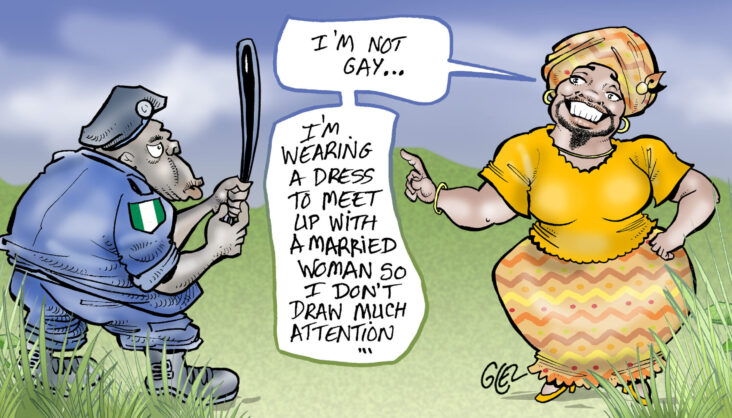[ad_1]
Nigerian men may soon no longer be allowed to attend costume balls dressed as Mami Wata. A parliamentary proposal aims to criminalise cross-dressing, defined as “the practice of wearing clothes usually worn by a person of the opposite sex”.
If the proposed law is passed, anyone found guilty of this dress code could face up to six months in prison or a fine of $1,200 (€1,173).
Of course, this is more about targeting non-binary individuals – who do not identify as either male or female -, gay people and people in any stage of gender reassignment, rather than fans of the Creole Company’s song “Au Bal Masqué“.
This bill aims to strengthen the Same Sex Marriage Prohibition Act (SSMPA), which forbids same-sex partners from living together or any “public display of same-sex lovemaking”, signed by Goodluck Jonathan in 2014.
Transphobia
Whether or not this new cross-dressing bill comes into force, its timeliness reflects the drive to further criminalise Nigeria’s LGBTQ+ community.
Holding up verses from holy texts, supporters of the tougher law claim they want to protect family values – their logic being that wearing clothes of another gender could potentially inspire shameful same-sex relationships -, as well as humanity and civilisation as a whole. And they argue that these moral values unquestionably dominate Nigerian society.
Dominant or not, homophobic and transphobic views are rife on social media. LGBTQ+ activists plan to sound the alarm for the international community. And since humour can be used to de-dramatise and as a springboard for digital virality, cross-dressing personality Bobrisky tweeted that changing the law would certainly help solve security problems, electricity shortages and inflation.
Will there be exceptions to this law? The potential cross-dressing amendment could include an exemption for artists. For example, an actor could play an African version of Mrs Doubtfire where a man pretends to be a governess. Similarly, an actress could play the role of Yentl, the girl who cross-dresses as a boy so that she can attend an all-male school. Finally, the creativity of so-called “cabaret” or humorous shows could be less inhibited.
It remains to be defined precisely which fashion accessory is exclusively masculine and which is feminine.
Understand Africa’s tomorrow… today
We believe that Africa is poorly represented, and badly under-estimated. Beyond the vast opportunity manifest in African markets, we highlight people who make a difference; leaders turning the tide, youth driving change, and an indefatigable business community. That is what we believe will change the continent, and that is what we report on. With hard-hitting investigations, innovative analysis and deep dives into countries and sectors, The Africa Report delivers the insight you need.
[ad_2]
Source link
